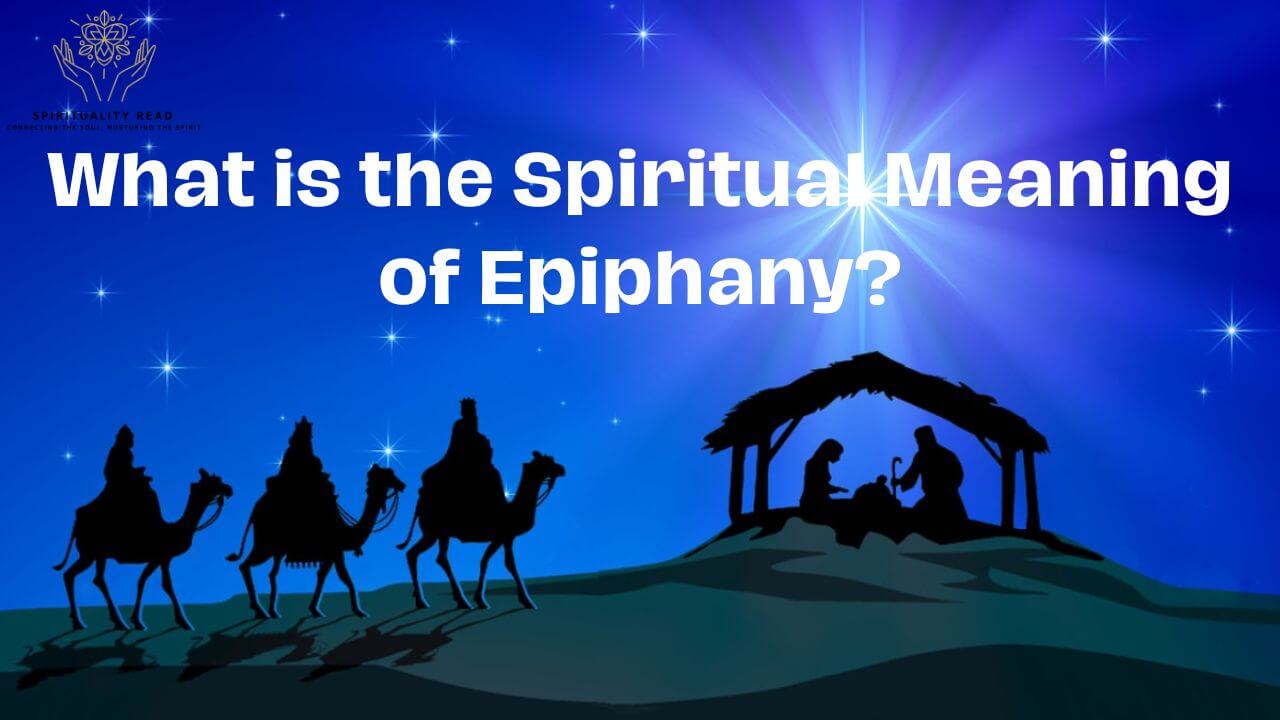The spiritual meaning of Epiphany is often associated with sudden realizations or profound revelations and holds deep spiritual significance.
In this exploration, we’ll delve into Epiphany’s historical roots, religious connections, and cultural variations, uncovering its symbolism and impact on personal growth.
Meaning of Epiphany
Epiphany, rooted in ancient Greek traditions, goes beyond sudden realizations.
In Christianity, it marks the revelation of Jesus as the Son of God, celebrated with events like the Magi’s visit. Symbolized by water, light, and gifts, it signifies purification, divine illumination, and blessings.
Personal epiphanies drive positive change and self-discovery. Epiphany’s impact spans art, literature, and modern celebrations, blending traditions with contemporary twists.
Embracing profound realizations fosters mindfulness and purpose, making Epiphany a universal journey of spiritual fulfillment.
History of Epiphany
Epiphany’s history traces back to ancient times when it meant divine manifestations. In Christianity, it became a key feast, commemorating the Magi’s visit to baby Jesus.
Over the years, Epiphany evolved, embracing diverse cultural celebrations. Its history is a tale of spiritual revelation and universal significance.
Historical Roots of Epiphany
The term “Epiphany” traces its origins to ancient Greece, where it initially meant the manifestation of a god. Early celebrations revolved around divine appearances and revelations. Over time, these traditions evolved, blending with various cultural practices.
Also Read: The Spiritual Meaning of Life: Power of Gratitude and Contentment
How Is It Celebrated?
Epiphany is celebrated diversely worldwide. Christian traditions include special church services and the blessing of water. Cultural festivities feature parades shared meals, and the exchange of gifts, echoing the Magi’s offerings.
Unique customs like Epiphany swims or special bread recipes add distinct flavors to the celebrations, making it a globally diverse tapestry of traditions.
The Spiritual Meaning Of Epiphany In The Bible
The spiritual meaning of Epiphany in the Bible centers on the revelation of divine truths. Specifically, it marks the manifestation of Jesus Christ as the Son of God.
The biblical narrative, notably the visit of the Magi, symbolizes the acknowledgment of Jesus’ significance beyond regional boundaries. Epiphany emphasizes moments of divine enlightenment and recognition, highlighting the transformative power of understanding one’s spiritual purpose.
In essence, the biblical perspective on Epiphany unveils a profound connection between humanity and the divine, offering a pathway to spiritual awakening and deeper understanding.
6 Aspects: Spiritual Meaning of Epiphany
Aspects of the Spiritual Meaning of Epiphany are mentioned below:
| Spiritual Aspect | Meaning of Epiphany |
| Self-realization | An epiphany can be a sudden, profound realization or insight about one’s own spiritual nature and purpose in life. |
| Divine revelation | An epiphany can be a sudden, profound realization or insight about one’s spiritual nature and purpose in life. |
| Enlightenment | An epiphany can signify a moment of spiritual enlightenment, where one becomes aware of the true nature of reality or gains a deeper understanding of spiritual concepts. |
| Transformation | An epiphany can lead to personal and spiritual growth, as one’s newfound understanding inspires positive change and transformation. |
| Connection to a higher power | An epiphany may bring a sense of connection and unity with a higher power, such as God or a divine presence, helping the individual to feel guided and supported on their spiritual journey. |
| Clarity | Epiphanies can bring clarity and deeper understanding to previously confusing or ambiguous spiritual concepts, helping individuals to navigate their spiritual path with greater ease and confidence. |
Five Facts About the Spiritual Meaning Of Epiphany
Let’s break down the nitty-gritty of Epiphany’s spiritual meaning with five quick facts:
Revelation of Jesus
Imagine Epiphany as the grand reveal in a blockbuster movie, with Jesus taking the spotlight as the Son of God. It’s like the universe pulling back the curtain on something extraordinary.
Symbolic Elements
Epiphany isn’t just words; it’s a cosmic language. Water, light, and gifts become the spiritual emojis: water purifies, light brings divine wisdom, and gifts are the universe’s way of saying, “You’re acknowledged.”
Personal Enlightenment
Now, let’s get personal. Epiphany isn’t just a Sunday sermon; it’s those ‘aha’ moments in your life. Think of it as a compass guiding you toward positive change and self-discovery, your spiritual adventure.
Cultural Diversity
Epiphany isn’t a one-size-fits-all celebration. It’s a global party with diverse traditions and expressions. From Baptisms to unique rituals, it’s like a cultural potluck of spiritual vibes.
Universal Significance
Whether deep into religious beliefs or just navigating your spiritual journey, Epiphany brings everyone together. It’s a universal language, connecting us on this shared quest for understanding and fulfillment.
The Spiritual Meaning Of Epiphany Across Religions
Epiphany’s spiritual meaning extends across religions. In Christianity, it signifies Jesus as the Son of God, emphasized by the Magi’s visit. In Eastern Orthodox traditions, it symbolizes the Baptism of Jesus, representing purification.
Other faiths also acknowledge divine manifestation, uniting them in the shared pursuit of spiritual awakening and growth.
Religious Significance
Within Christianity, Epiphany marks the revelation of Jesus Christ as the Son of God. Biblical stories, such as the visit of the Magi, highlight the theme of divine manifestation. Understanding these religious underpinnings adds depth to the spiritual meaning of Epiphany.
The Evolution Of Epiphany Celebrations In Modern Times
Epiphany celebrations have evolved in modern times, marrying religious traditions with contemporary flair. Church rituals persist, but now coexist with multicultural expressions like parades and shared meals.
The timeless symbols of Epiphany, like water blessings and gift exchanges, remain, creating a dynamic fusion of tradition and innovation in global festivities.
Modern-Day Celebrations
Fast forward to today, Epiphany hasn’t lost its charm. It’s a blend of ancient traditions and modern flair. From religious ceremonies to cultural remixes, it’s a timeless celebration.
Comparison Between Epiphany And Other Religious Festivals
The comparison between Epiphany and other religious festivals highlights both shared elements and distinctive features, showcasing the diversity of spiritual celebrations.
Epiphany in Christianity:
- Epiphany in Christianity, particularly in Western traditions, emphasizes the revelation of Jesus Christ as the Son of God.
- Celebrated on January 6th, it includes rituals like the blessing of water and commemorates the visit of the Magi to the infant Jesus.
Diwali in Hinduism:
- Diwali, the Hindu Festival of Lights, celebrates the triumph of light over darkness and good over evil.
- It usually falls between October and November, marked by the lighting of lamps, colorful decorations, and fireworks.
Eid al-Fitr in Islam:
- Eid al-Fitr marks the end of Ramadan, the holy month of fasting in Islam.
- Celebrated with prayers, feasting, and giving of charity, it emphasizes gratitude, community, and the breaking of the fast.
Hanukkah in Judaism:
- Hanukkah, the Festival of Lights in Judaism, commemorates the miracle of the menorah oil lasting eight days.
- Celebrated in December, it involves the lighting of the menorah, playing games, and enjoying festive foods.
Vesak in Buddhism:
- Vesak, or Buddha Day, is a key Buddhist celebration honoring the birth, enlightenment, and death of Siddhartha Gautama.
- Celebrated with prayer, meditation, and acts of kindness, it emphasizes spiritual reflection and compassion.
Common Threads:
- Many festivals, including Epiphany, share common themes of light symbolizing enlightenment, the triumph of good over evil, and a sense of community and charity.
- Rituals involving food, prayers, and symbolic gestures are prevalent across various religious celebrations.
Distinctive Features:
- While Epiphany is rooted in Christian narratives, other festivals have unique stories and legends associated with their origins.
- Cultural practices, specific religious texts, and the timing of celebrations distinguish each festival.
Cultural Variations
Epiphany transcends religious boundaries, finding a place in diverse cultures. From the Christian celebration of the Baptism of Jesus to the Eastern Orthodox traditions, each culture brings unique customs to Epiphany, contributing to a rich tapestry of global celebrations.
Symbolism in Epiphany
The symbolic elements of water, light, and gifts play a crucial role in the spiritual meaning of Epiphany. Water signifies purification and rebirth, while light represents the illumination of divine truth. Gifts, mirroring the Magi’s offerings, symbolize the exchange of blessings.
Conclusion
In conclusion, understanding the spiritual meaning of Epiphany goes beyond religious affiliations. It encompasses a universal journey of self-discovery, personal growth, and the pursuit of inner peace. Embracing moments of profound realization can lead to a more fulfilling and purposeful life.
Also Read: Best Crystals for Manifesting Love: Top 10 Crystals!

